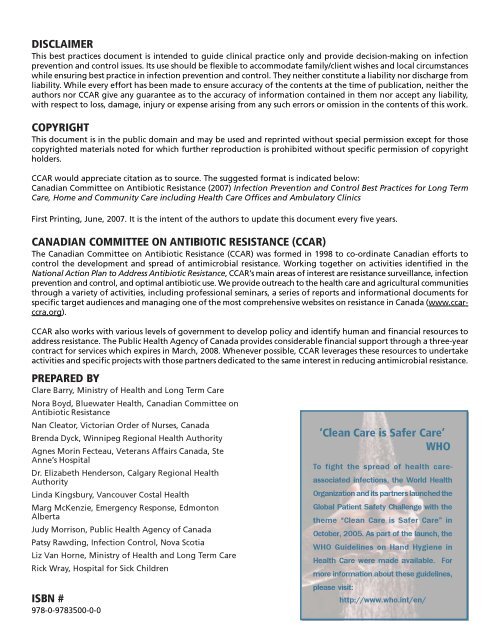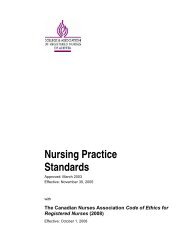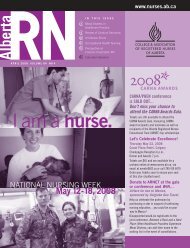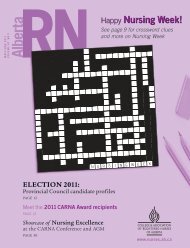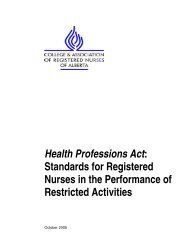Infection Prevention and Control Best Practices - College ...
Infection Prevention and Control Best Practices - College ...
Infection Prevention and Control Best Practices - College ...
Create successful ePaper yourself
Turn your PDF publications into a flip-book with our unique Google optimized e-Paper software.
DISCLAIMER<br />
This best practices document is intended to guide clinical practice only <strong>and</strong> provide decision-making on infection<br />
prevention <strong>and</strong> control issues. Its use should be flexible to accommodate family/client wishes <strong>and</strong> local circumstances<br />
while ensuring best practice in infection prevention <strong>and</strong> control. They neither constitute a liability nor discharge from<br />
liability. While every effort has been made to ensure accuracy of the contents at the time of publication, neither the<br />
authors nor CCAR give any guarantee as to the accuracy of information contained in them nor accept any liability,<br />
with respect to loss, damage, injury or expense arising from any such errors or omission in the contents of this work.<br />
COPYRIGHT<br />
This document is in the public domain <strong>and</strong> may be used <strong>and</strong> reprinted without special permission except for those<br />
copyrighted materials noted for which further reproduction is prohibited without specific permission of copyright<br />
holders.<br />
CCAR would appreciate citation as to source. The suggested format is indicated below:<br />
Canadian Committee on Antibiotic Resistance (2007) <strong>Infection</strong> <strong>Prevention</strong> <strong>and</strong> <strong>Control</strong> <strong>Best</strong> <strong>Practices</strong> for Long Term<br />
Care, Home <strong>and</strong> Community Care including Health Care Offices <strong>and</strong> Ambulatory Clinics<br />
First Printing, June, 2007. It is the intent of the authors to update this document every five years.<br />
CANADIAN COMMITTEE ON ANTIBIOTIC RESISTANCE (CCAR)<br />
The Canadian Committee on Antibiotic Resistance (CCAR) was formed in 1998 to co-ordinate Canadian efforts to<br />
control the development <strong>and</strong> spread of antimicrobial resistance. Working together on activities identified in the<br />
National Action Plan to Address Antibiotic Resistance, CCAR’s main areas of interest are resistance surveillance, infection<br />
prevention <strong>and</strong> control, <strong>and</strong> optimal antibiotic use. We provide outreach to the health care <strong>and</strong> agricultural communities<br />
through a variety of activities, including professional seminars, a series of reports <strong>and</strong> informational documents for<br />
specific target audiences <strong>and</strong> managing one of the most comprehensive websites on resistance in Canada (www.ccarccra.org).<br />
CCAR also works with various levels of government to develop policy <strong>and</strong> identify human <strong>and</strong> financial resources to<br />
address resistance. The Public Health Agency of Canada provides considerable financial support through a three-year<br />
contract for services which expires in March, 2008. Whenever possible, CCAR leverages these resources to undertake<br />
activities <strong>and</strong> specific projects with those partners dedicated to the same interest in reducing antimicrobial resistance.<br />
PREPARED BY<br />
Clare Barry, Ministry of Health <strong>and</strong> Long Term Care<br />
Nora Boyd, Bluewater Health, Canadian Committee on<br />
Antibiotic Resistance<br />
Nan Cleator, Victorian Order of Nurses, Canada<br />
Brenda Dyck, Winnipeg Regional Health Authority<br />
Agnes Morin Fecteau, Veterans Affairs Canada, Ste<br />
Anne’s Hospital<br />
Dr. Elizabeth Henderson, Calgary Regional Health<br />
Authority<br />
Linda Kingsbury, Vancouver Costal Health<br />
Marg McKenzie, Emergency Response, Edmonton<br />
Alberta<br />
Judy Morrison, Public Health Agency of Canada<br />
Patsy Rawding, <strong>Infection</strong> <strong>Control</strong>, Nova Scotia<br />
Liz Van Horne, Ministry of Health <strong>and</strong> Long Term Care<br />
Rick Wray, Hospital for Sick Children<br />
ISBN #<br />
978-0-9783500-0-0<br />
‘Clean Care is Safer Care’<br />
WHO<br />
To fight the spread of health careassociated<br />
infections, the World Health<br />
Organization <strong>and</strong> its partners launched the<br />
Global Patient Safety Challenge with the<br />
theme “Clean Care is Safer Care” in<br />
October, 2005. As part of the launch, the<br />
WHO Guidelines on H<strong>and</strong> Hygiene in<br />
Health Care were made available. For<br />
more information about these guidelines,<br />
please visit:<br />
http://www.who.int/en/


